外研版八年级上册英语Module5LaoSheTeahouse教案(word文档良心出品)
- 格式:docx
- 大小:14.40 KB
- 文档页数:7
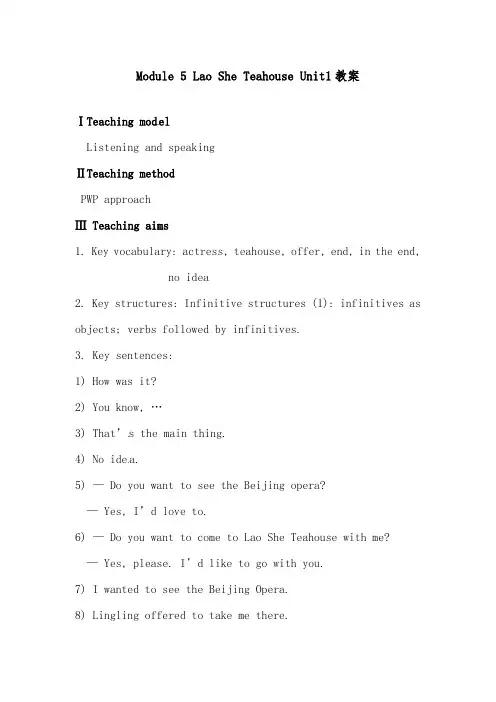
Module 5 Lao She Teahouse Unit1教案ⅠTeaching modelListening and speakingⅡTeaching methodPWP approachⅢ Teaching aims1. Key vocabulary: actress, teahouse, offer, end, in the end,no idea2. Key structures: Infinitive structures (1): infinitives as objects; verbs followed by infinitives.3. Key sentences:1) How was it?2) You know, …3) That’s the main thing.4) No ide a.5) — Do you want to see the Beijing opera?—Yes, I’d love to.6) — Do you want to come to Lao She Teahouse with me?— Yes, p lease. I’d like to go with you.7) I wanted to see the Beijing Opera.8) Lingling offered to take me there.Ⅳ Teaching aidsTape recorder, OHP, videoⅤTeaching StepsStep 1 Warming-up1. Enjoy a play: Lao She Teahouse2. Show some pictures.3. Look at the pictures, and talk something about the pictures.4. Introduce the new words.5. Learn the new words.6. Read the new words.Step 2 Work in pairs.1. Ask the students to read the words in the box in Activity 1.2. Look at the pictures in Activity 1, and talk about them.3. Work in pairs. Use the words from the box to help you. Step 3 Listening practice.1. Ask the students to read through the sentences in Activity2.1) Betty often sees / wants to see some traditional Beijing opera.2) Betty knows / doesn’t know Lao She Teahouse.3) Lingling says that the opera is easy / difficult to understand.2. Play the recording once without stopping.3. Listen and underline the correct words.4. Play the recording again and ask the whole class to check with a partner.5. Check the answers:Keys: 1. wa nts 2. doesn’t know 3. difficultStep 4 Listen and read.1. Show some pictures, and ask the students to talk about them.2. Ask the students to read the conversation silently.3. Play the recording and ask the students to listen and read the conversation.4. Read the conversation.5. Act it out.6. Learn “Everyday English”1) How was it?2) You know, …3) That’s the main thing.4) No idea.Step 5 Check the true sentences.1. Ask the students to read the conversation again.2. Now check the true sentences.1) Tony went to Lao She Teahouse with Betty and Lingling.2) Betty understood the opera.3) Lingling and Betty stayed longer than they planned.4) Betty enjoyed the opera.5) Betty would like to go to the opera again.6) Betty knew about Lao She before she went to the teahouse.3. Ask the students to check with a partner.4. Check the answers:Keys: 1. × 2. × 3. √ 4. √ 5. √ 6. ×Step 6 Complete the passage.1. Ask the students to read the words in the box in Activity 4.2. Read through the passage.Betty wanted to see the Beijing opera, so Lingling (1) ________ to take Betty to Lao She Teahouse. The words of the opera were (2) ________ to understand, but the actors and (3)__________ were excellent. They only planned to watch for an hour, but in the (4) ________, they stayed for three hours. Betty thought it was interesting — that was the (5) ________ thing!3. Complete the passage with the correct form of the words from the box.4. Ask the students to check with a partner.5. Check the answers:Keys: 1. offered 2. difficult 3. actresses 4. end 5. mainStep 7 Listen and repeat.1. Play the recording once without stopping.2. Play the recording again and ask the whole class to repeat.1) — Do you want to see the Beijing opera?—Yes, I’d love to.2) — Do you want to come to Lao She Teahouse with me? —Yes, please. I’d like to go with you.3. Ask the students to listen and mark the intonation.4. Now listen again and repeat.Step 8 Work in pairs.1. Ask the students to read the conversations in Activity 5 aloud.2. Make true sentences.1) I want to ___________ next week.2) They offered to ___________.3) I hope to ___________ one day.4) My parents agree to ____________ on Saturday.3. Talk about something you’d like to do or see.— I want to go to Xinjiang and ride horses.—…Step 9 Important and difficult points1. — Who is Lao She? 老舍是谁?— No idea. 不知道。
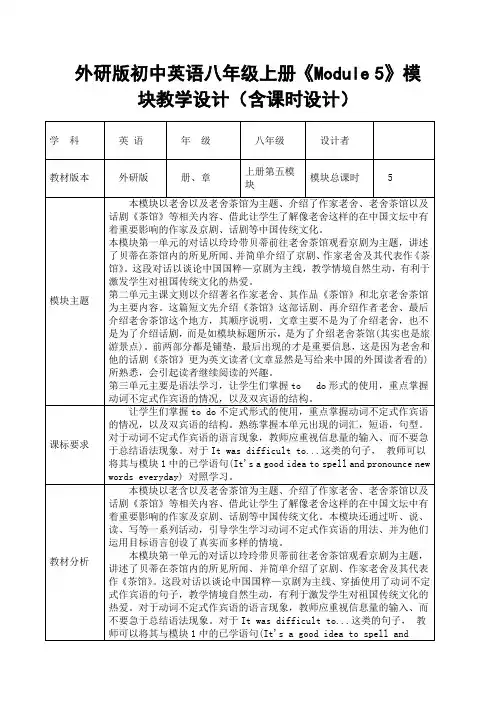
外研版初中英语八年级上册《Module 5》模块教学设计(含课时设计)【模块学习主题】Module 5Lao She Teahouse模块学习规划课时教学流程设计Step5 A. An hour B. Two hoursC. Three hours4.Who is Lao She?A. A writerB. An actorC. A playerSs: Check the answers in groups.T: Check the answers with the Ss.(2).Ask the students to listen tothe conversation to check the truesentences, then check the answers.(Activity 3)(3)Ss listen to the tape for thethird time, and finish thefollowing sentences.①. Betty wanted to see the BeijingOpera,so Lingling____ to take herthere.②. They planned to watch for anhour,but______ _____ _____,they stayed for three hours.③. Lao She is especially_______for his play Teahouse.Ss:Check the answers in pairs.T: Check the answers with the Ss.(1). T: Organize the students toread the conversation with thevideo.(2).Ask the Ss to practice theconversation with their partners.(3) Have a competition: Ask thestudents to act out theconversation, and see which groupis the best.Post-listening.Task4: Retell the dialogue(1)Ask the students to retellthe dialogue.(2)T: Chinese culture is broad看学生是否能转述对话内容利用短文挖空形式复述对话巩固所学知识点再次训练学生对知识点的掌握。
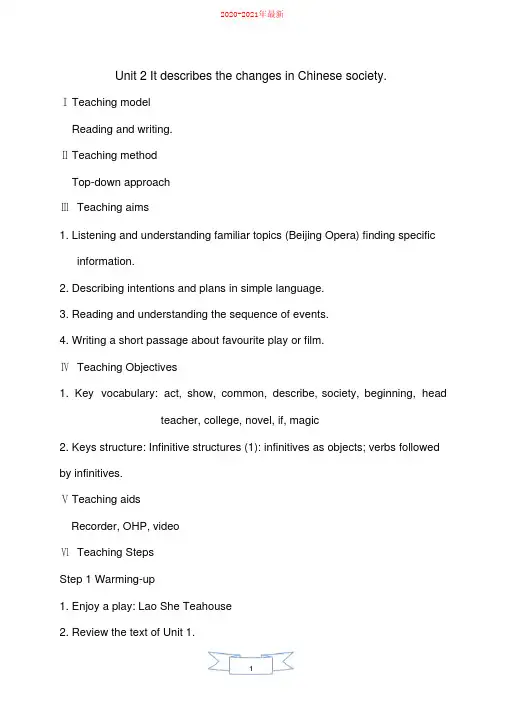
Unit 2 It describes the changes in Chinese society.ⅠTeaching modelReading and writing.ⅡTeaching methodTop-down approachⅢTeaching aims1. Listening and understanding familiar topics (Beijing Opera) finding specificinformation.2. Describing intentions and plans in simple language.3. Reading and understanding the sequence of events.4. Writing a short passage about favourite play or film.ⅣTeaching Objectives1. Key vocabulary: act, show, common, describe, society, beginning, headteacher, college, novel, if, magic2. Keys structure: Infinitive structures (1): infinitives as objects; verbs followed by infinitives.ⅤTeaching aidsRecorder, OHP, videoⅥTeaching StepsStep 1 Warming-up1. Enjoy a play: Lao She Teahouse2. Review the text of Unit 1.3. Show some pictures.4. Look at the pictures, and talk something about the pictures.5. Introduce the new words.6. Learn the new words.7. Read the new words.Step 2 Work in pairs.1. Ask and answer questions about Lao She.1) What do you know about Lao She?2) What are his most famous books and plays?3) What’s the special about Lao She Teahouse?2. Tell the students about Lao She.Lao She (1899-1966) was one of the most renowned contemporary Chinese writers, famous for his novels and plays. His works have been translated into over 20 foreign languages.Step 3 Reading1. Play the recording and listen to the tape carefully.2. Ask the students to read through the passage.3. Read the passage by themselves.4. Read the text together.5. Read the passage and match the headings with the paragraphs in Activity 2.6. Check with a partner.7. Call back the answers from the whole class.Keys: 1 b 2 c 3 aStep 4 Complete the timeline.1. Read the passage again.2. Complete the timeline with information about Lao She.LAO SHE1957 ____________________________________1924 ____________________________________1918 ____________________________________1913 ____________________________________1899 born in Beijing3. Check with a partner.4. Call back the answers from the whole class.Keys:1957 He wrote Teahouse.1924 He left home and went to England.1918 He finished the teacher’s school and became a head teacher of a primary school.1913 His mother sent him to a teacher’s school.Step 5 Complete the table.Somethingabout Teahouse ★The play has (1) ______ acts.★It tells us the story of Wang Lifa and (2) ________________________in Beijing.Somethingabout Lao She ★He was born in Beijing in 1899.★He studied in a(n) (3)______________ from 1913 to 1918.★From 1924 to 1929, he taught (4) ________ at a college in London.★He was one of the greatest Chinesewriters of the (5) _________ century.Lao She Teahouse ★You can enjoy the Beijing Opera, traditionalmusic or(6) ___________ at the teahouse.Keys: three, the customers of his teahouse, teachers’ school, Chinese, twmagic showsStep 6 Complete the passage.1. Ask the students to read the words in the box in Activity 4.centurycommon if magic society writers2. Ask the students to read through the passage in Activity 4.Lao She ’s play, Teahouse, has three acts. It describes the life of Wang Lifa andthe changes to the lives of (1) ________ people in Chinese (2) ________ in the first half of the twentieth (3) _______.Lao She went to a teacher’s school in Beijing, taught in London, and later returned to China. He is one of China’s greatest (4) ________. Come to Lao She Teahouse in Beijing (5)__________ you like Beijing Opera, traditional music or (6) ________ shows.3. Complete the passage with the correct form of the words from the box.4. Check with a partner.5. Call back the answers from the whole class.Keys: 1. common 2. society 3. century 4. writers 5. if 6. magicStep 7 Learning to learnWhen you read a passage, remember to look at its title, the paragraph headings and the photos if there are any. They will help you understand the main ideas. Step 8 Writing1. Complete the table.Teahouse Your favourite play orfilmWhere does the storytake place?When does the storytake place?What is the story’smain idea?Why is it good?2. Write sentences about Teahouse with the information in Activity 5. Use thepassage in Activity 2 to help you.The story of Teahouse takes place in Beijing.Now join the sentences. Write a passage about Teahouse.3. Write a passage about your favourite play or film. Use Activities 5 and 6 tohelp you.Step 9 Language points1. … and was named “People’s Artist” Lao She is one of the greatest Chines writes of the twentieth century.(他)被誉为“人民艺术家”,老舍是20世纪中国最伟大的作家之一。
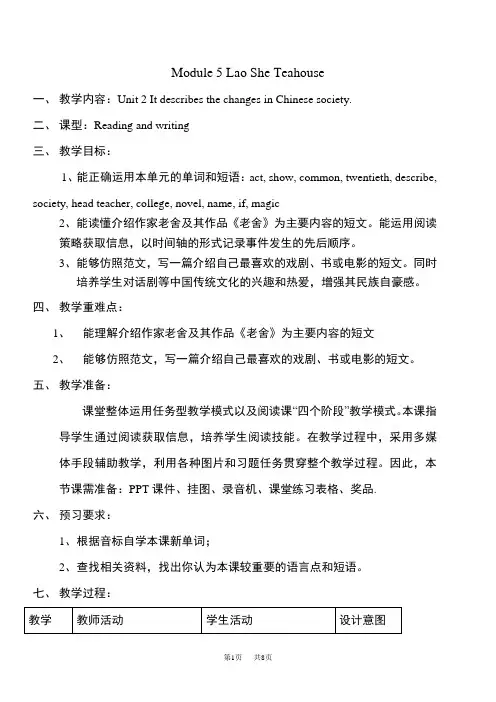
Module 5 Lao She Teahouse
一、教学内容:Unit 2 It describes the changes in Chinese society.
二、课型:Reading and writing
三、教学目标:
1、能正确运用本单元的单词和短语:act, show, common, twentieth, describe, society, head teacher, college, novel, name, if, magic
2、能读懂介绍作家老舍及其作品《老舍》为主要内容的短文。
能运用阅读
策略获取信息,以时间轴的形式记录事件发生的先后顺序。
3、能够仿照范文,写一篇介绍自己最喜欢的戏剧、书或电影的短文。
同时
培养学生对话剧等中国传统文化的兴趣和热爱,增强其民族自豪感。
四、教学重难点:
1、能理解介绍作家老舍及其作品《老舍》为主要内容的短文
2、能够仿照范文,写一篇介绍自己最喜欢的戏剧、书或电影的短文。
五、教学准备:
课堂整体运用任务型教学模式以及阅读课“四个阶段”教学模式。
本课指导学生通过阅读获取信息,培养学生阅读技能。
在教学过程中,采用多媒体手段辅助教学,利用各种图片和习题任务贯穿整个教学过程。
因此,本节课需准备:PPT课件、挂图、录音机、课堂练习表格、奖品.
六、预习要求:
1、根据音标自学本课新单词;
2、查找相关资料,找出你认为本课较重要的语言点和短语。
七、教学过程:。
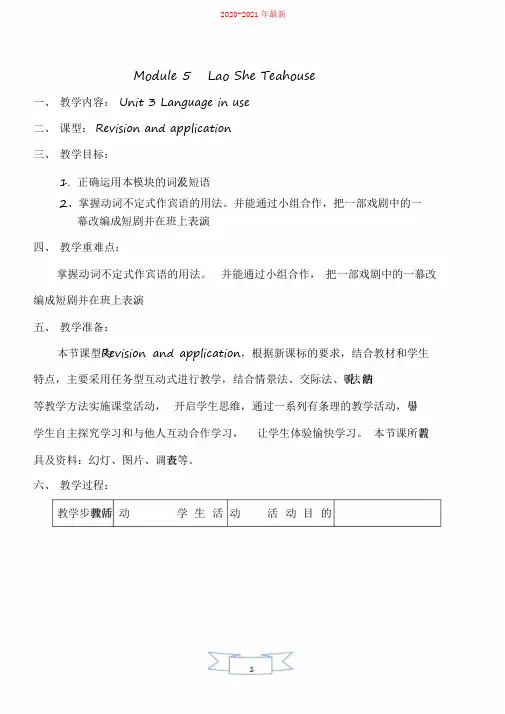
Module 5 Lao She Teahouse一、教学内容:Unit 3 Language in use二、课型:Revision and application三、教学目标:1. 正确运用本模块的词汇及短语2、掌握动词不定式作宾语的用法。
并能通过小组合作,把一部戏剧中的一幕改编成短剧并在班上表演。
四、教学重难点:掌握动词不定式作宾语的用法。
并能通过小组合作,把一部戏剧中的一幕改。
编成短剧并在班上表演五、教学准备:本节课型为R evision and application,根据新课标的要求,结合教材和学生法纳特点,主要采用任务型互动式进行教学,结合情景法、交际法、听说法、归导等教学方法实施课堂活动,开启学生思维,通过一系列有条理的教学活动,引教学生自主探究学习和与他人互动合作学习,让学生体验愉快学习。
本节课所需表等。
具及资料:幻灯、图片、调查六、教学过程:活动学生活动活动目的教师教学步骤11. 1.Show some pictures 1. Discuss in pairs复习和巩固所学的Leading-i and ask students to and make sentences知识点。
n discuss in pairs and like these:(8’)make sentences like I want to ⋯.these: She offered to ⋯.I want to ⋯We planned to ⋯.She offered to ⋯.My mother hopesWe planned to ⋯.to ⋯.My mother hopesto ⋯.And write someinfinitive sentenceson the blackboard2. 1. Get the Ss to sum 1. Try to understand复习巩固前面两个While-tas up the sentences on and sum up the单元所掌握的语法k(20 ’)the blackboard.(动词sentences on the 和词汇。
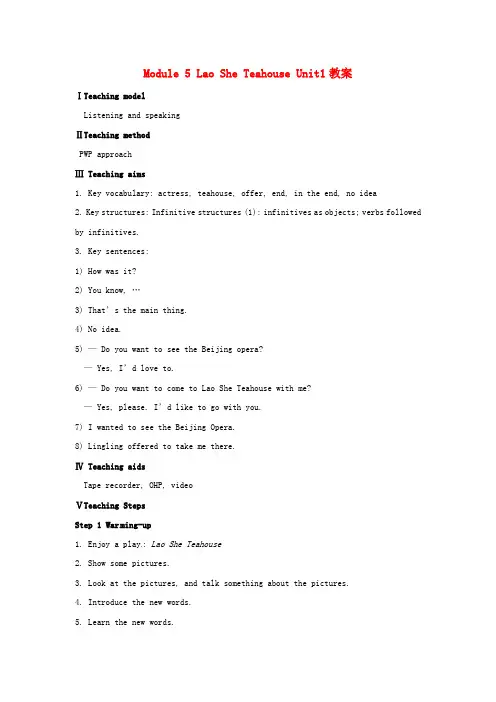
Module 5 Lao She Teahouse Unit1教案ⅠTeaching modelListening and speakingⅡTeaching methodPWP approachⅢ Teaching aims1. Key vocabulary: actress, teahouse, offer, end, in the end, no idea2. Key structures: Infinitive structures (1): infinitives as objects; verbs followed by infinitives.3. Key sentences:1) How was it?2) You know, …3) That’s the main thing.4) No idea.5) — Do you want to see the Beijing opera?—Yes, I’d love to.6) — Do you want to come to Lao She Teahouse with me?— Yes, plea se. I’d like to go with you.7) I wanted to see the Beijing Opera.8) Lingling offered to take me there.Ⅳ Teaching aidsTape recorder, OHP, videoⅤTeaching StepsStep 1 War ming-up1. Enjoy a play: Lao She Teahouse2. Show some pictures.3. Look at the pictures, and talk something about the pictures.4. Introduce the new words.5. Learn the new words.6. Read the new words.Step 2 Work in pairs.1. Ask the students to read the words in the box in Activity 1.actress dance music play sin g teahouse theatre traditional2. Look at the pictures in Activity 1, and talk about them.3. Work in pairs. Use the words from the box to help you.Step 3 Listening practice.1. Ask the students to read through the sentences in Activity2.1) Betty often sees / wants to see some traditional Beijing opera.2) Betty knows / doesn’t know Lao She Teahouse.3) Lingling says that the opera is easy / difficult to understand.2. Play the recording once without stopping.3. Listen and underline the correct words.4. Play the recording again and ask the whole class to check with a partner.5. Check the answers:Keys: 1. wants 2. doesn’t know 3. difficultStep 4 Listen and read.1. Show some pictures, and ask the students to talk about them.2. Ask the students to read the conversation silently.3. Play the recording and ask the students to listen and read the conversation.4. Read the conversation.5. Act it out.6. Learn “Everyday E nglish”1) How was it?2) You know, …3) That’s the main thing.4) No idea.Step 5 Check the true sentences.1. Ask the students to read the con versation again.2. Now check the true sentences.1) Tony went to Lao She Teahouse with Betty and Lingling.2) Betty understood the opera.3) Lingling and Betty stayed longer than they planned.4) Betty enjoyed the opera.5) Betty would like to go to the opera again.6) Betty knew about Lao She before she went to the teahouse.3. Ask the students to check with a partner.4. Check the answers:Keys: 1. × 2. × 3. √ 4. √ 5. √ 6. ×Step 6 Complete the passage.1. Ask the students to read the words in the box in Activity 4.actress difficult end main offer2. Read through the passage.Betty wanted to see the Beijing opera, so Lingling (1) ________ to take Betty to Lao She Teahouse. The words of the opera were (2) ________ to understand, but the actors and (3)__________ were exc ellent. They only planned to watch for an hour, but in the (4) ________, they stayed for th ree hours. Betty thought it was interesting — that was the (5) ________ thing!3. Complete the passage with the correct form of the words from the box.4. Ask the students to check with a partner.5. Check the answers:Key s: 1. offered 2. difficult 3. actresses 4. end 5. mainStep 7 Listen and repeat.1. Play the recording once without stopping.2. Play the recording again a nd ask the whole class to repeat.1) — Do you want to see the Beijing opera?—Yes, I’d love t o.2) — Do you want to come to Lao She Teahouse with me?—Yes, please. I’d like to go with you.3. Ask the students to listen and mark the intonation.4. Now listen again and repeat.Step 8 Work in pairs.1. Ask the students to read the conversations in Activity 5 aloud.2. Make true sentences.1) I want to ___________ next week.2) They offered to ___________.3) I hope to ___________ one day.4) My parents agree to ____________ on Saturday.3. Talk about something you’d like to do or see.— I want to go to Xinjiang and ride horses.—…Step 9 Important and difficult points1. — Who is Lao She? 老舍是谁?— No idea. 不知道。
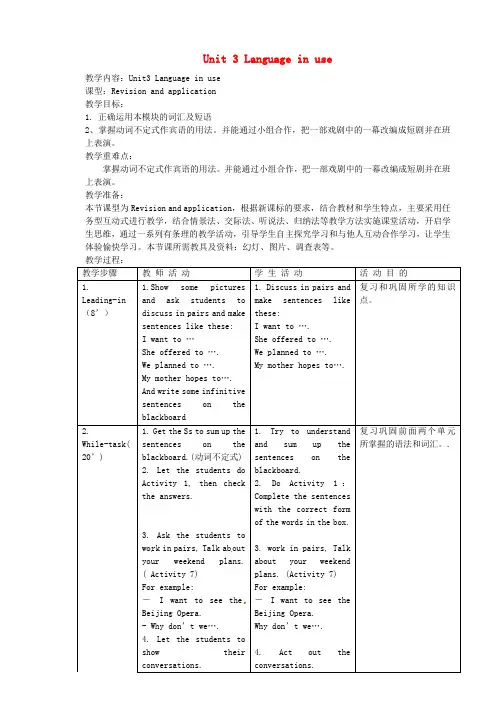
Unit 3 Language in use教学内容:Unit3 Language in use课型:Revision and application教学目标:1. 正确运用本模块的词汇及短语2、掌握动词不定式作宾语的用法。
并能通过小组合作,把一部戏剧中的一幕改编成短剧并在班上表演。
教学重难点:掌握动词不定式作宾语的用法。
并能通过小组合作,把一部戏剧中的一幕改编成短剧并在班上表演。
教学准备:本节课型为Revision and application,根据新课标的要求,结合教材和学生特点,主要采用任务型互动式进行教学,结合情景法、交际法、听说法、归纳法等教学方法实施课堂活动,开启学生思维,通过一系列有条理的教学活动,引导学生自主探究学习和与他人互动合作学习,让学生体验愉快学习。
本节课所需教具及资料:幻灯、图片、调查表等。
教学步骤教师活动学生活动活动目的1. Leading-in (8’)1.Show some picturesand ask students todiscuss in pairs and makesentences like these:I want to …She offered to ….We planned to ….My mother hopes to….And write some infinitivesentences on theblackboard1. Discuss in pairs andmake sentences likethese:I want to ….She offered to ….We planned to ….My mother hopes to….复习和巩固所学的知识点。
2.While-task( 20’)1. Get the Ss to sum up thesentences on theblackboard.(动词不定式)2. Let the students doActivity 1, then checkthe answers.3. Ask the students towork in pairs, Talk ab outyour weekend plans.( Activity 7)For example:-I want to see theBeijing Opera.- Why don’t we….4. Let the students toshow theirconversations.1. Try to understandand sum up thesentences on theblackboard.2. Do Activity 1:Complete the sentenceswith the correct formof the words in the box.3. work in pairs, Talkabout your weekendplans. (Activity 7)For example:-I want to see theBeijing Opera.Why don’t we….4. Act out theconversations.复习巩固前面两个单元所掌握的语法和词汇。
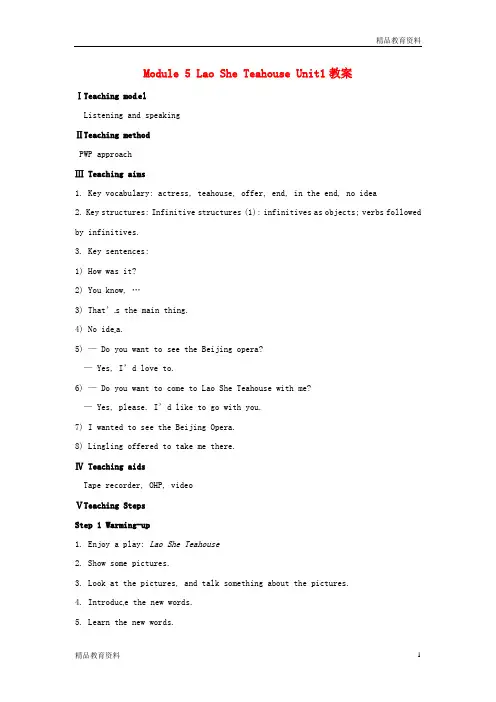
Module 5 Lao She Teahouse Unit1教案ⅠTeaching mod elListening and speakingⅡTeaching methodPWP approachⅢ Teaching aims1. Key vocabulary: actress, teahouse, offer, end, in the end, no idea2. Key structures: Infinitive structures (1): infinitives as objects; verbs followed by infinitives.3. Key sentences:1) How was it?2) You know, …3) That’s the main thing.4) No ide a.5) — Do you want to see the Beijing opera?—Yes, I’d love to.6) — Do you want to come to Lao She Teahouse with me?— Yes, p lease. I’d like to go with you.7) I wanted to see the Beijing Opera.8) Lingling offered to take me there.Ⅳ Teaching aidsTape recorder, OHP, videoⅤTeaching StepsStep 1 Warming-up1. Enjoy a play: Lao She Teahouse2. Show some pictures.3. Look at the pictures, and talk something about the pictures.4. Introduc e the new words.5. Learn the new words.6. Read the new words.Step 2 Work in pairs.1. Ask the students to read the words in the box in Activity 1.actres s dance music play sing teahouse theatre traditional2. Look at the pictures in Activity 1, and talk about them.3. Work in pairs. Use the words from the box to help you.Step 3 Listening practice.1. Ask the students to read thr ough the sentences in Activity2.1) Betty often sees / wants to see some traditional Beijing opera.2) Betty knows / doesn’t know Lao She Teahouse.3) Lingling says that the opera is easy / difficult to understand.2. Play the recording once without stopping.3. Listen and underline the correct words.4. Play t he recording again and ask the whole class to check with a partner.5. Check the answers:Keys: 1. wa nts 2. doesn’t know 3. difficultStep 4 Listen and read.1. Show some pictu res, and ask the students to talk about them.2. Ask the students to read the conversation silently.3. Play the recording and ask the students to listen and read the conversation.4. Read the conversation.5. Act it out.6. Learn “Everyday English”1) How was it?2) You know, …3) That’s the main thing.4) No idea.Step 5 Check the true sentences.1. Ask the students to read the conversation again.2. Now check the true sentences.1) Tony went to Lao She Teahouse with Betty and Lingling.2) Betty understood the opera.3) Lingling and Betty stayed longer than they planned.4) Betty enjoyed the opera.5) Betty would like to go to the opera again.6) Betty knew about Lao She before she went to the teahouse.3. Ask the students to check with a partner.4. Check the answers:Keys: 1. × 2. × 3. √ 4. √ 5. √ 6. ×Step 6 Complete the passage.1. Ask the students to read the words in the box in Activity 4.actress difficult end main offer2. Read through the passage.Betty wanted to see the Beijing opera, so Lingling (1) ________ to take Betty to Lao She Teahouse. The words of the opera were (2) ________ to understand, but the actors and (3)__________ were excellent. They only planned to watch for an hour, but in the (4) ________, they stayed for three hours. Betty thought it was interesting — that was the (5) ________ thing!3. Complete the passage with the correct form of the words from the box.4. Ask the students to check with a partner.5. Check the answers:Keys: 1. offered 2. difficult 3. actresses 4. end 5. mainStep 7 Listen and repeat.1. Play the recording once without stopping.2. Play the recording again and ask the whole class to repeat.1) — Do you want to see the Beijing opera?—Yes, I’d love to.2) — Do you want to come to Lao She Teahouse with me?—Yes, please. I’d like to go with you.3. Ask the students to listen and mark the intonation.4. Now listen again and repeat.Step 8 Work in pairs.1. Ask the students to read the conversations in Activity 5 aloud.2. Make true sentences.1) I want to ___________ next week.2) They offered to ___________.3) I hope to ___________ one day.4) My parents agree to ____________ on Saturday.3. Talk about something you’d like to do or see.— I want to go to Xinjiang and ride horses.—…Step 9 Important and difficult points1. — Who is Lao She? 老舍是谁?— No idea. 不知道。
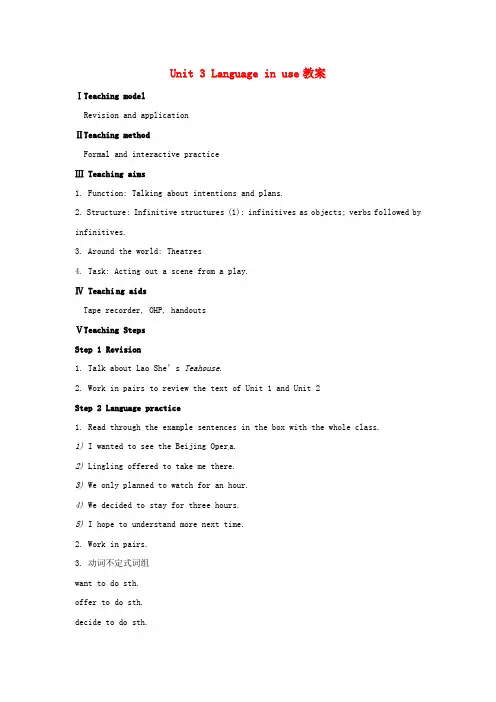
Unit 3 Language in use教案ⅠTeaching modelRevision and applicationⅡTeaching methodFormal and interactive practiceⅢ Teaching aims1. Function: Talking about intentions and plans.2. Structure: Infinitive structures (1): infinitives as objects; verbs followed by infinitives.3. Around the world: Theatres4. Task: Acting out a scene from a play.Ⅳ Teachi ng aidsTape recorder, OHP, handoutsⅤTeaching StepsStep 1 Revision1. Talk about Lao She’s Teahouse.2. Work in pairs to review the text of Unit 1 and Unit 2Step 2 Language practice1. Read through the example sentences in the box with the whole class.1) I wanted to see the Beijing Oper a.2) Lingling offered to take me there.3) We only planned to watch for an hour.4) We decided to stay for three hours.5) I hope to understand more next time.2. Work in pairs.3. 动词不定式词组want to do sth.offer to do sth.decide to do sth.remember to do sth.forget to do sth.stop to do sth.agree to do sth.hope to do sth.like to do sth.Step 3 Complete the sentences.1. Ask the students to read through the words in the box in Activity 1.go see spend stay teach write2. Ask the students to read through the sentences in Activity 1.Do you want to go to the teahouse?1) We decided ____________ at home because it was raining.2) Lao She started ____________ Chinese in London in 1924.3) I tried ____________ poems.4) They plan _________ the film tomorrow.5) I want __________ my holiday in Beijing.3. Complete the sentences with the correct form of the words in the box.4. Ask the students to check with a partner.5. Check the answers:Keys: 1. to stay 2. to teach 3. to write 4. to see 5. to spendStep 4 Complete the note.1. Ask the students to read the conversation in Activity2.Betty: I’d lo ve to see the Beijing Opera again.Lingling: Would you like me to take you? Where can we go this time?Daming: I know! You can go to Mei Lanfang Theatre.Lingling: Good idea! Let’s go next Saturday, Betty.2. Complete the note with the correct form of the words in the box.advise decide offer wantBetty (1)__________ to see the Beijing Opera again. Lingling (2)__________ to take her. Daming (3)___________ them to go to Mei Lanfang Theatre. Lingling (4)__________to go next Saturday.3. Ask the students to check with a partner.4. Check the answers:Keys: 1. wanted 2. offered 3. advised 4. decided5. Read the conversation together.Step 5 Complete the passage.1. Ask the students to read through the passage in Activity 3.Lu Xun is one of the greatest writers of modern China. He was born in Shaoxing, Zhejiang Province, in 1881. At first, Lu Xun hoped (1) __________ (help) the Chinese people become healthy and strong, so he decided (2) _______ (be) a doctor. After a few years, he started (3) _________ (write) short stories because he wanted (4) ________ (teach) people about society. One of his most famous stories is The True Story of Ah Q. It describes the hard life of Ah Q and makes people (5) ______ (think) about society. In the 1920s, people began to translate his works into English.2. Complete the passage with the correct form of the words in brackets.3. Ask the students to check with a partner.4. Check the answers:Keys: 1.to help 2. to be 3. to write 4. to teach 5. thinkStep 6 Complete the passage.1. Ask the students to read through the words in the box in Activity 4.cheer magic take place theatre wonderful2. Ask the students to read through the passage in Activity 4.We went to the (1) ________ last night to see a play. I had a (2) __________ evening. The play was very good and all the actors were excellent. The story (3) __________ in a small village in China. It was all about an old box of gold! The box was a (4) _______ box and was difficult to open. The play was very interesting, and everyone (5) _________ at the end of the play!3. Complete the passage with the correct form of the words and expression in the box.4. Ask the students to check with a partner.5. Check the answers:Keys: 1. theatre 2. wonderful 3. took place 4. magic 5. cheeredStep 7 Listening practice.Step 8 Listening practice.1. Ask the stu dents to read through the sentences in Activity 6 individually.1) Steve went to Shakespeare’s Globe Theatre last night.2) Vicky offered to take Steve to the theatre.3) Steve didn’t try to understand the words.4) Vicky hopes to see her favourite play.5) Vicky thinks her parents will take her to the theatre.2. Play the tape.3. Listen again and check (√) the true sentences.4. Ask the students to check with a partner.5. Check the answers:Step 9 Work in pairs.1. Talk about your weekend plan. Use the words and expressions in the box to help you.hope how about let’s want why don’t we why not would like — I want to see the Beijing Opera.— W hy don’t we …?2. Now act out your conversation for the class.Step 10 Reading1. Ask the students to read the passage in Activity 8.2. Read through the questions in Activity 8.1) You would find the passage in ___________.a) a book b) a school newspaper c) a magazine2) The writer ____________.a) liked the play b) didn’t like the play c) didn’t say he liked it or not3) The actors and actresses in the play wore ____________.a) the same clothes as todayb) their best clothesc) clothes of the first half of the twentieth century4) Li Nan is ____________.a) a famous actor b) a student c) an actress3. Choose the correct answer.4. Ask the students to check with a partner.5. Check the answers:Keys: 1. b 2. a 3. c 4. bStep 11 Around the world: Theatres1. Ask the students to look at the picture and discuss what they can see.2. Read through the information with the whole class.Western theatre started in Greece, around 600 BC. The theatres were very big. About 15,000 people could watch a play at the same time. The audience sat on stone seats to watch the performances. Some of the theatres survive, as do same of the plays by ancient Greek writers. People still watch these plays today.3. Talk something about “Theatres”.Step 12 Module task: Acting out a scene from a p lay.1. Work in groups. Find a play. Think about these questions.1) Where does it take place?2) Who is in it?3) What is the story?4) What are the special moments in it?2. Choose a scene and practice it.3. Act out the scene in front of the class.Step 13 Grammar动词不定式的用法(1)动词不定式是由“to+动词原形”构成 (有时可以不带to)。
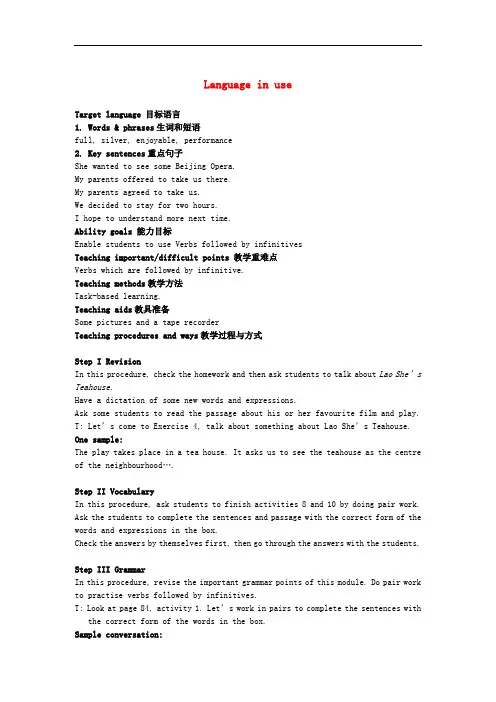
Language in useTarget language 目标语言1. Words & phrases生词和短语full, silver, enjoyable, performance2. Key sentences重点句子She wanted to see some Beijing Opera.My parents offered to take us there.My parents agreed to take us.We decided to stay for two hours.I hope to understand more next time.Ability goals 能力目标Enable students to use Verbs followed by infinitivesTeaching important/difficult points 教学重难点Verbs which are followed by infinitive.Teaching methods教学方法Task-based learning.Teaching aids教具准备Some pictures and a tape recorderTeaching procedures and ways教学过程与方式Step I RevisionIn this procedure, check the homework and then ask students to talk about Lao She’s Teahouse.Have a dictation of some new words and expressions.Ask some students to read the passage about his or her favourite film and play. T: Let’s come to Exercise 4, talk about something about Lao She’s Teahouse. One sample:The play takes place in a tea house. It asks us to see the teahouse as the centre of the neighbourhood….Step II VocabularyIn this procedure, ask students to finish activities 8 and 10 by doing pair work. Ask the students to complete the sentences and passage with the correct form of the words and expressions in the box.Check the answers by themselves first, then go through the answers with the students.Step III GrammarIn this procedure, revise the important grammar points of this module. Do pair work to practise verbs followed by infinitives.T: Look at page 84, activity 1. Let’s work in pairs to complete t he sentences with the correct form of the words in the box.Sample conversation:S1: I’d like to see Beijing Opera one day.S2: He wanted to see Beijing Opera one day.S1: Yes. Let’s go to the opera.S2: They agreed to go to the opera.Ask some pairs to act before the class. Then go through the answers with the students. T: Well done! Let’s come to activity 2. Please complete the sentences with the correct form of the words in the box.Give the students a few minutes to write the correct answers.Ask some pairs to read their answers. Go through the answers with students. Then go on with activity 3.Step IV ListeningIn this procedure, ask students to listen to the conversation and check the true sentences in activity 6.Go through the answers with students and play the tape again to ask them to check their answers.Step V Speaking and writingIn this procedure, ask students to do activities 7 and 9.T: Sometimes we can express our feelings through what we say. Let’s come to activities 9. Work in pairs, match sentences 1-4 with sentences a-d.One sample:S1: It’s lovely to see you!S2: I’m very happy.S1: The food here is excellent.S2: It’s delicious.…Then ask students to work in pairs and write a short conversation using the sentences in activity 9 and the verbs hope, want, would like.One sample conversation:S1: It’s lovely to see you!S2: Me too!S1: Would you like to go the park?S2: I want to, but I must do my home work.S1: It’s a pity. I hope to go with you next time.S2: OK. Thank you all the same.Then ask some pairs to act out the conversation.Step VI Module taskIn this procedure, ask students to read Around the world first. Make sure they understand the meaning of the passage. Explain some difficult sentences to the students if necessary.Then ask them to work in groups and write a scene from a play.Give the students a few minutes to write the conversation. Ask some groups to actout the conversation in front of the class.Step VII HomeworkAsk students to1. revise this Module.2. finish the activities in the workbook.Teaching resources教学资源库I. 重点知识详解(1) 不定式作宾语接不定式的动词主要有:want, like, would like,decide,hope,help,learn,mean,plan,seem,wish, fail等。
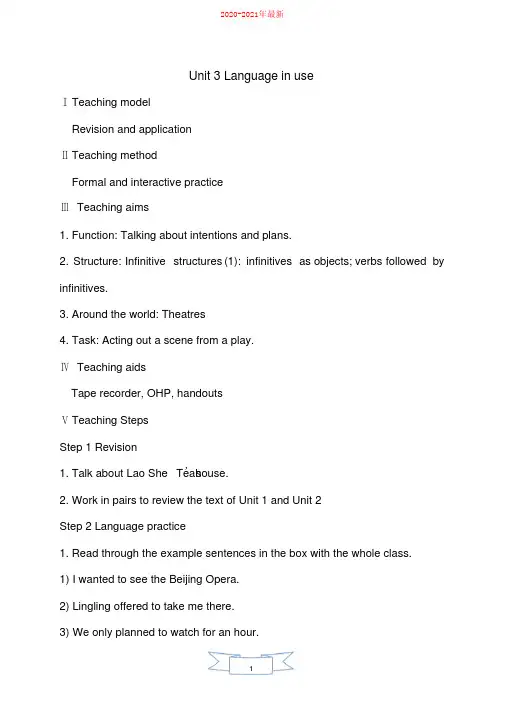
Unit 3 Language in useⅠTeaching modelRevision and applicationⅡTeaching methodFormal and interactive practiceⅢTeaching aims1. Function: Talking about intentions and plans.2. Structure: Infinitive structures (1): infinitives as objects; verbs followed by infinitives.3. Around the world: Theatres4. Task: Acting out a scene from a play.ⅣTeaching aidsTape recorder, OHP, handoutsⅤTeaching StepsStep 1 RevisionTeahouse.1. Talk about Lao She’s2. Work in pairs to review the text of Unit 1 and Unit 2Step 2 Language practice1. Read through the example sentences in the box with the whole class.1) I wanted to see the Beijing Opera.2) Lingling offered to take me there.3) We only planned to watch for an hour.4) We decided to stay for three hours.5) I hope to understand more next time.2. Work in pairs.3. 动词不定式词组want to do sth.offer to do sth.decide to do sth.remember to do sth.forget to do sth.stop to do sth.agree to do sth.hope to do sth.like to do sth.Step 3 Grammar动词不定式的用法(1)动词不定式是由“to+动词原形”构成(有时可以不带to)。
说课稿Module 5 Lao She TeahouseUnit 1 I wanted to see the Beijing Opera一、教材分析1.教材的地位和作用:本模块围绕老舍的作品《茶馆》以及北京老舍茶馆展开,内容涉及老舍茶馆、老舍个人生平以及著名话剧《茶馆》。
Unit1主要讲述的是Lingling带Betty去老舍茶馆看京剧和Betty在欣赏完京剧的感想。
对话的末尾提及“Lao She is a great writer. He’s especially famous for his play Teahouse.”为Unit2的展开提供了方向。
本单元的生词量不大,重点语法为动词不定式。
2.教学目标(1)知识目标:能掌握本单元的重点单词和句型:1)Teahouse, offer, end, in the end, no idea2) I wanted to see the Beijing Opera, so Lingling offered to take me there. We only planned to watch for an hour...I hope to understand more next time.(2)能力目标:1)能理解关于关于在茶馆看京剧并含不定式的对话大意,听取相关细节信息。
2)通过跟读和小组练习,能够较流畅的朗读对话。
3)通过小组合作,能尝试运用所学的单词和句型进行有关计划的对话。
(3)情感目标:能够体验中国的传统文化,培养了解中国传统文化的兴趣和合作学习的精神。
3.教学重点难点重点:offer to, plan to, hope to, want to等在对话中的运用。
难点:用不定式进行有关计划的对话。
二、教法学法为了达到本节课的教学目标,突破重点难点,遵循《义务教育英语课程标准(2011年版)》的要求,即从学生的学习兴趣、生活经验和认知水平出发来设计教学活动,倡导体验、实践、参与、合作与交流的学习方式,本节课主要体现了以下教法学法的理念:情境教学法——通过音乐、图片、视频等方式创设语言情境,丰富学生的直观感受,让学生在情境中学在情境中说。
Module 5 Lao She TeahouseUnit 3 Language in useⅠTeaching modelRevision and applicationⅡTeaching methodFormal and interactive practiceⅢ Teaching aims1. Function: Talking about intentions and plans.2. Structure: Infinitive structures (1): infinitives as objects; verbs followed by infinitives.3. Around the world: Theatres4. Task: Acting out a scene from a play.Ⅳ Teaching aidsTape recorder, OHP, handoutsⅤTeaching StepsStep 1 Revision1. Talk about Lao She’s Teahouse.2. Work in pairs to review the text of Unit 1 and Unit 2Step 2 Language practice1. Read through the example sentences in the box with the whole class.1) I wanted to see the Beijing Opera.2) Lingling offered to take me there.3) We only planned to watch for an hour.4) We decided to stay for three hours.5) I hope to understand more next time.2. Work in pairs.3. 动词不定式词组want to do sth.offer to do sth.decide to do sth.remember to do sth.forget to do sth.stop to do sth.agree to do sth.hope to do sth.like to do sth.Step 3 Complete the sentences.1. Ask the students to read through the words in the box in Activity 1.go see spend stay teach write2. Ask the students to read through the sentences in Activity 1.Do you want to go to the teahouse?1) We decided ____________ at home because it was raining.2) Lao She started ____________ Chinese in London in 1924.3) I tried ____________ poems.4) They plan _________ the film tomorrow.5) I want __________ my holiday in Beijing.3. Complete the sentences with the correct form of the words in the box.4. Ask the students to check with a partner.5. Check the answers:Keys: 1. to stay 2. to teach 3. to write 4. to see 5. to spendStep 4 Complete the note.1. Ask the students to read the conversation in Activity2.Betty: I’d love to see the Beijing Opera again.Lingling: Would you like me to take you? Where can we go this time?Daming: I know! You can go to Mei Lanfang Theatre.Lingling: Good idea! Let’s go next Saturday, Betty.2. Complete the note with the correct form of the words in the box.advise decide offer wantBetty (1)__________ to see the Beijing Opera again. Lingling (2)__________ to takeher. Daming (3)___________ them to go to Mei Lanfang Theatre. Lingling (4)__________ to go next Saturday.3. Ask the students to check with a partner.4. Check the answers:Keys: 1. wanted 2. offered 3. advised 4. decided5. Read the conversation together.Step 5 Complete the passage.1. Ask the students to read through the passage in Activity 3.Lu Xun is one of the greatest writers of modern China. He was born in Shaoxing, Zhejiang Province, in 1881. At first, Lu Xun hoped (1) __________ (help) the Chinese people become healthy and strong, so he decided (2) _______ (be) a doctor. After a few years, he started (3) _________ (write) short stories because he wanted (4) ________ (teach) people about society. One of his most famous stories is The True Story of Ah Q. It describes the hard life of Ah Q and makes people (5) ______ (think) about society. In the 1920s, people began to translate his works into English.2. Complete the passage with the correct form of the words in brackets.3. Ask the students to check with a partner.4. Check the answers:Keys: 1.to help 2. to be 3. to write 4. to teach 5. thinkStep 6 Complete the passage.1. Ask the students to read through the words in the box in Activity 4.cheer magic take place theatre wonderful2. Ask the students to read through the passage in Activity 4.We went to the (1) ________ last night to see a play. I had a (2) __________ evening. The play was very good and all the actors were excellent. The story (3) __________ in a small village in China. It was all about an old box of gold! The box was a (4) _______ box and was difficult to open. The play was very interesting, and everyone (5) _________ at the end of the play!3. Complete the passage with the correct form of the words and expression in the box.4. Ask the students to check with a partner.5. Check the answers:Keys: 1. theatre 2. wonderful 3. took place 4. magic 5. cheeredStep 7 Listening practice.1. Ask the students to read through the questions in Activity 5 individually.1) Who is visiting London?a) Vicky. b)Steve. c) Romeo.2) What are they talking about?a) Romeo and Juliet. b) London. c) Vicky’s parents.2. Play the tape.3. Listen and choose the correct answer.4. Ask the students to check with a partner.5. Check the answers:Step 8 Listening practice.1. Ask the students to read through the sentences in Activity 6 individually.1) Steve went to Shakespeare’s Globe Theatre last night.2) Vicky offered to take Steve to the theatre.3) Steve didn’t try to understand the words.4) Vicky hopes to see her favourite play.5) Vicky thinks her parents will take her to the theatre.2. Play the tape.3. Listen again and check (√) the true sentences.4. Ask the students to check with a partner.5. Check the answers:Step 9 Work in pairs.1. Talk about your weekend plan. Use the words and expressions in the box to help you.hope how about let’s want why don’t we why not would like — I want to see the Beijing Opera.—Why don’t we …?2. Now act out your conversation for the class.Step 10 Reading1. Ask the students to read the passage in Activity 8.2. Read through the questions in Activity 8.1) You would find the passage in ___________.a) a book b) a school newspaper c) a magazine2) The writer ____________.a) liked the play b) didn’t like the play c) didn’t say he liked it o r not3) The actors and actresses in the play wore ____________.a) the same clothes as todayb) their best clothesc) clothes of the first half of the twentieth century4) Li Nan is ____________.a) a famous actor b) a student c) an actress3. Choose the correct answer.4. Ask the students to check with a partner.5. Check the answers:Keys: 1. b 2. a 3. c 4. bStep 11 Around the world: Theatres1. Ask the students to look at the picture and discuss what they can see.2. Read through the information with the whole class.Western theatre started in Greece, around 600 BC. The theatres were very big. About 15,000 people could watch a play at the same time. The audience sat on stone seats to watch the performances. Some of the theatres survive, as do same of the plays by ancient Greek writers. People still watch these plays today.3. Talk something about “Theatres”.Step 12 Module task: Acting out a scene from a play.1. Work in groups. Find a play. Think about these questions.1) Where does it take place?2) Who is in it?3) What is the story?4) What are the special moments in it?2. Choose a scene and practice it.3. Act out the scene in front of the class.Step 13 Grammar动词不定式的用法(1)动词不定式是由“to+动词原形”构成 (有时可以不带to)。
Module 5 Lao She Teahouse Unit1教案ⅠTeaching modelListening and speakingⅡTeaching methodPWP approachⅢ Teaching aims1. Key vocabulary: actress, teahouse, offer, end, in the end,no idea2. Key structures: Infinitive structures (1): infinitives as objects; verbs followed by infinitives.3. Key sentences:1) How was it?2) You know, …3) That’s the main thing.4) No idea.5) — Do you want to see the Beijing opera?—Yes, I’d love to.6) — Do you want to come to Lao She Teahouse with me?— Yes, plea se. I’d like to go with you.7) I wanted to see the Beijing Opera.8) Lingling offered to take me there.Ⅳ Teaching aidsTape recorder, OHP, videoⅤTeaching StepsStep 1 Warming-up1. Enjoy a play: Lao She Teahouse2. Show some pictures.3. Look at the pictures, and talk something about the pictures.4. Introduce the new words.5. Learn the new words.6. Read the new words.Step 2 Work in pairs.1. Ask the students to read the words in the box in Activity 1.2. Look at the pictures in Activity 1, and talk about them.3. Work in pairs. Use the words from the box to help you. Step 3 Listening practice.1. Ask the students to read through the sentences in Activity2.1) Betty often sees / wants to see some traditional Beijing opera.2) Betty knows / doesn’t know Lao She Teahouse.3) Lingling says that the opera is easy / difficult to understand.2. Play the recording once without stopping.3. Listen and underline the correct words.4. Play the recording again and ask the whole class to check with a partner.5. Check the answers:Keys: 1. want s 2. doesn’t know 3. difficultStep 4 Listen and read.1. Show some pictures, and ask the students to talk about them.2. Ask the students to read the conversation silently.3. Play the recording and ask the students to listen and read the conversation.4. Read the conversation.5. Act it out.6. Learn “Everyday English”1) How was it?2) You know, …3) That’s the main thing.4) No idea.Step 5 Check the true sentences.1. Ask the students to read the conversation again.2. Now check the true sentences.1) Tony went to Lao She Teahouse with Betty and Lingling.2) Betty understood the opera.3) Lingling and Betty stayed longer than they planned.4) Betty enjoyed the opera.5) Betty would like to go to the opera again.6) Betty knew about Lao She before she went to the teahouse.3. Ask the students to check with a partner.4. Check the answers:Keys: 1. × 2. × 3. √ 4. √ 5. √ 6. ×Step 6 Complete the passage.1. Ask the students to read the words in the box in Activity 4.2. Read through the passage.Betty wanted to see the Beijing opera, so Lingling (1) ________ to take Betty to Lao She Teahouse. The words of the opera were (2) ________ to understand, but the actors and (3)__________ were exc ellent. They only planned to watch for an hour, but in the (4) ________, they stayed for three hours. Betty thought it was interesting — that was the (5) ________ thing!3. Complete the passage with the correct form of the words from the box.4. Ask the students to check with a partner.5. Check the answers:Keys: 1. offered 2. difficult 3. actresses 4. end 5. mainStep 7 Listen and repeat.1. Play the recording once without stopping.2. Play the recording again and ask the whole class to repeat.1) — Do you want to see the Beijing opera?—Yes, I’d love t o.2) — Do you want to come to Lao She Teahouse with me? —Yes, please. I’d like to go with you.3. Ask the students to listen and mark the intonation.4. Now listen again and repeat.Step 8 Work in pairs.1. Ask the students to read the conversations in Activity 5 aloud.2. Make true sentences.1) I want to ___________ next week.2) They offered to ___________.3) I hope to ___________ one day.4) My parents agree to ____________ on Saturday.3. Talk abo ut something you’d like to do or see.— I want to go to Xinjiang and ride horses.—…Step 9 Important and difficult points1. — Who is Lao She? 老舍是谁?— No idea. 不知道。
Module 5 Lao She TeahouseUnit 1 I wanted to see the Beijing Opera.授课时间:I Teaching modelListening and speakingn Teachi ng methodPWP approach川Teachi ng aims1. Key vocabulary: actress, teahouse, offer, end, in the end, no idea2. Key structures: Infinitive structures (1): infinitives as objects; verbs followedby infinitives.3. Key sentences:1) How was it? 2) You know,…3) That' the main thing. 4) No idea.5) —Do you want to see the Beijing opera?—Yes, I ' d love to.6) —Do you want to come to Lao She Teahouse with me?—Yes, please. I ' d like to go with you.7) I wanted to see the Beijing Opera.8) Lingling offered to take me there.IV Teaching aidsVideo multimediaV Teachi ng StepsStep 1 Warming-up1. oral English2. Show some pictures.3. Learn the new words.4. Enjoy a play: Beijing Opera and say something about the pictures. Step 2 Work in pairs.1. Ask the students to read the words in the box in Activity 1.2. Look at the pictures in Activity 1, and talk about them.3. Work in pairs. Use the words from the box to help you.Step 3 Listening practice.1. Ask the students to read through the sentences in Activity2.2. Play the recording once without stopping.3. Listen and underline the correct words.4. Play the recording again and ask the whole class to check with a partner.5. Check the answers:Step 4 Listen and read.1. Ask the students to read the conversation silently.2. find the phrases on paper 。
3. check answers in pairs.4. check in front of the class.5. remember the phrases in one minute.6 Read the conversation follow the tape. Answer the questions on paper.7 Pairwork . Act it out.Step 5 Check the true sentences.1. Ask the students to read the conversation again.2. Now check the true senten ces.Step 6 Complete the passage.1. Ask the students to read the words in the box in Activity 4.2. Read through the passage.Step 7 Work in pairs.1. Ask the students to read the conversations in Activity 5 aloud.2. Make true senten ces.Step 8Homework1. recite the new words and the phrases2. 同步训练M5U1Module 5 Lao She TeahouseUn it1 I wan ted to see the Beiji ng Opera一、课前准备口语训练。
(看看谁读的又流利又准确,加油!)要求:大声朗读2遍并翻译。
时间约为3分钟。
A: Where did you go last night, Betty?B: I went to Lao She Teahouse.A: Who is Lao She?B: He is a great writer. He ' famous for his play Teahouse.A: What do you thi nk of it?B: It was great.A: Who was with you?B: Lin gli ng.A: What did you do there?B: We drank tea and watched an opera.A: Did you un dersta nd the opera?B: No, it was difficult to un dersta nd the words.Drink 过去式drank A: Daming B : Betty二. 课堂交流与探究(一)读P34页对话,写出下列短语并在文中标出。
(找出后小组 核对答案)6. ___ see the Beiji ng Opera7. pla n to do sth8. hope to do sth9. take …to …(二)回答问题。
(同学们你们看懂对话了吗?做做以下练习吧! 做完后小组核对,并找小组成员给对答案。
1. Who went to Lao She Teahouse last ni ght?2. Did Betty un dersta nd the opera? __________________3. How long did they stay in the Teahouse?4. What is Lao She famous for? ___________________(三) 小组朗读对话(四) page35 activity3 &4三. 当堂检测(考考自己吧!)1. Finally they worked out the problem .(替换划线部分)A. At o neeB. At firstC. In the end2. Dad agreed _______ the summer holiday in San ya.A. to spe ndB. spe ndC. spe ndingD. to spe nding3. — _______ did you stay there?—I stayed there for two hours.A. How soo nB. How farC. How longD. How often4. — Who clea ned the room?— _______ . But it was n 1. 想要做某事 _________________ 2. 提议做某事 ______________ 3. 最后 __________________ 4. 下次 ________________ 5.不知道。
________________ 10.be famous for/as. __________t me.A. No ideaB. Good ideaC. I seeD. Go on5. —How was that new film? —_______ .A. It was by Zhang YimouB. It was during 1978C. It was interesting 四.课后巩固小试牛刀(翻译句子)1. I want to see the Beijing opera. __________________ .2. My friends offered to help me learn English.3. We plan to watch for an hour, but in the end, we stayed for three hours.4. He is especially famous for his play Teahouse..词组.展示想要做某事_________________ 看京剧 ___________________提议做某事______________ 计划做某事 __________________最后___________________ . 希望做某事______________________下次______________ 带某人去某地_____________________________不知道。
_______________ 因…而出名…. ___________________二.语法学习(读下列句子,关注黑体字并翻译。
)1. I wanted to see the Beijing opera. __________________ .2. My friends offered to help me learn English.3. We plan to watch for an hour, but in the end, we stayed for three hours.4. I hope to understand the Beijing opera more next time.** 上述黑体字是动词不定式作宾语,动词不定式的结构为 ___________________ ,常见动词不定式作宾语的短语有:(参见P126)想要做某事_________________ 试着做某事 ________________决定做某事_________________ 希望做某事 _______________开始做某事_________________ 忘记做某事 ________________** 常见接双宾语的动词短语有:give sb. sth.= ________ lend sb. sth.= ___________send sb. sth.= ___________ teach sb. sth.= ____________buy sb. sth.= ____________ make sb. sth.= ____________翻译句子:1. I tell him a story.= I tell a story to him. _____________2.They gave me a book.= They gave a book to me.3. She bought her daughter a bike.=She bought a bike for her daughter. __________________三、用所给词的适当形式填空。